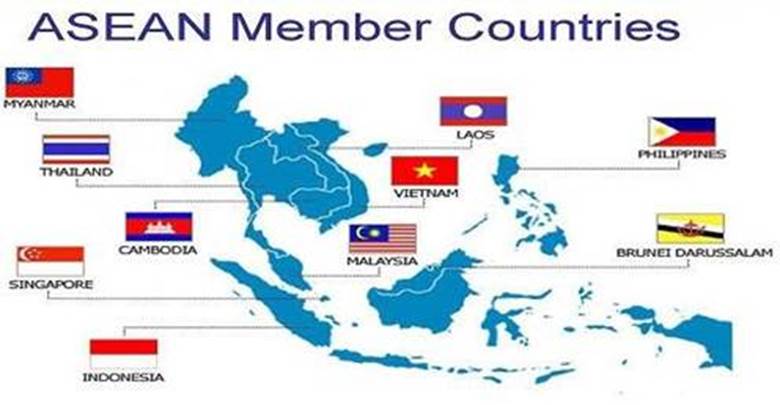Description

Copyright infringement not intended
Context: The Vice President, Shri Jagdeep Dhankhar, who is on a three-day tour of Cambodia, led the Indian delegation, including the External Affairs Minister, Dr S. Jaishankar, at the 19th ASEAN-India Summit in Phnom Penh, Cambodia.
Details:
- Vice President stated that India-ASEAN relationship forms the central pillar of India's ACT-EAST policy. He reiterated India’s support to ASEAN centrality in the Indo-Pacific.
- At the summit, ASEAN and India adopted a joint statement announcing the elevation of the existing Strategic Partnership to Comprehensive Strategic Partnership.
- Both sides reaffirmed the importance of maintaining and promoting peace, stability, maritime safety and security, freedom of navigation and overflight in the Indo-Pacific region.
- The Joint Statement also reiterated the commitment to enhance India-ASEAN cooperation in various areas such as maritime activities, counter-terrorism, transnational crimes, cyber security, digital economy, regional connectivity, smart agriculture, environment, science & technology, tourism, among other areas.
- The Joint Statement also proposes expediting the review of ASEAN-India Trade in Goods Agreement (AITIGA) to make it more user-friendly, simple, and trade-facilitative.
India and ASEAN:
- Association of Southeast Asian Nations (ASEAN), a 10-nation grouping, is considered one of the most influential groupings in Southeast Asia.
- It promotes intergovernmental cooperation and facilitates economic, political, security, military, educational, and sociocultural integration among its members and other countries in Asia.
- ASEAN operates under six fundamental principles, two of which are mutual respect for independence, sovereignty, and territorial integrity, and non-interference in member countries’ internal affairs.
- India and several other countries, including the US, China, Japan and Australia, are its dialogue partners.
- The ASEAN-India dialogue relations started with the establishment of a sectoral partnership in 1992.
- This graduated to full dialogue partnership in December 1995 and summit-level partnership in 2002.
- India is hosting the two-day conclave to mark the 30th anniversary of its relations with the 10-nation Association of Southeast Asian Nations (ASEAN).
- The ASEAN comprises Indonesia, Thailand, Vietnam, Laos, Brunei, the Philippines, Singapore, Cambodia, Malaysia and Myanmar.
Why ASEAN matters to India?
- The ten countries of South East Asia connect the two great oceans in both the geographical and civilizational sense.
- Central to India's Pacific vision, ASEAN assumes importance on the backdrop of an increasing Chinese influence in the region.
- While India and China are locked in a bitter standoff along the Line of Actual Control, New Delhi's outreach to ASEAN nations will help strengthen much needed diplomatic ties.
- ASEAN is also India's fourth-largest trade partner with about $86.9 Bn in trade between India and the ten ASEAN nations.
- ASEAN and India share land and maritime borders, and there is a lot of scope for enhancing connectivity through land, air and sea.
- India-Myanmar-Thailand Trilateral Highway is an ongoing effort to enhance road connectivity between Northeast India and Southeast Asia.
- ASEAN-India strategic partnership stands on a strong foundation of shared geographical, historical and civilisational ties.
- India’s Act East Policy, underlining ASEAN centrality, reflects the importance, India attaches to engagement with ASEAN.
- Inclusiveness, openness and ASEAN centrality and unity, lie at the heart of the new Indo-Pacific.
- With the increasing focus on oceans as providers of resources, the reservoirs of biodiversity, the highways of global trade and the frontiers of scientific research, cooperation in the maritime domain has become increasingly important under the overall rubric of ASEAN-India cooperation.
Issues with ASEAN:
- Lack of a custodian and lacks of strong institutions to guarantee the success of the implementation of its collective decisions.
- Facing strategic competition for influence in the Asia-Pacific between the United States and China and have been forced to choose sides.
- Each member faces their own unique social, economic, and political challenges. As a result, each seems to have no choice but focus on addressing their own internal affairs.
- ASEAN members faces internal and external security challenges that are border disputes and conflicts, illegal migration, ethnic crises etc.

Way Forward:
- ASEAN must put in extra efforts to sustain and enhance its existing successes and achievements. The bloc should emerge as a catalyst for peace by promoting rule of law in the region.
- ASEAN must also promote transparency and work to reduce corruption.
- This association needs to enhance closer coordination and regional connectivity. India should also start delivering the pending project. For ex. the India-Myanmar-Thailand (IMT) highways project
- ASEAN need to strike a good balance between commercial gains and environmental protection if ASEAN wishes to achieve inclusive growth and sustainable development.
https://pib.gov.in/PressReleasePage.aspx?PRID=1875478










